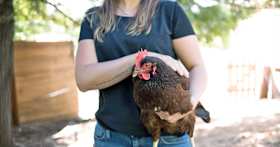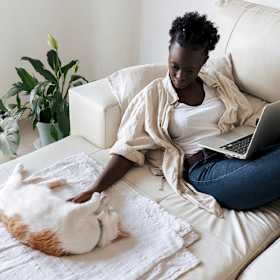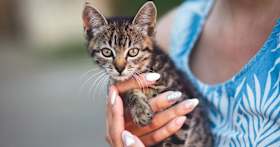What to Consider When Adopting a Parrot
Becoming a pet parent to a parrot is a whole lot more than feeding them bird seeds and letting them entertain themselves in a cage.
Becoming a pet parent to a parrot is a whole lot more than feeding them bird seeds and letting them entertain themselves in a cage.
by Dahlia Ghabour, | June 4, 2025

Maia Images / Stocksy
Parrots can make excellent pets, as long as you’re ready to care for their specific needs. For starters, you have to be willing to care for this pet for up to 80 years: Parrots live a long time, and they can be extremely loud pets. They require significant social interaction, mental stimulation, and large cages. Because of their long lifespans, many pet parrots outlive their parents, so consider adopting from rescues when bringing a parrot into your home.
You may be excited about the potential for long-term companionship and adorable bird shenanigans. But there are several questions you should ask yourself before adopting a parrot.
Are you prepared to care for them, considering their long lifespan?
Do you understand the hefty social needs and mental stimulation they require?
Are you familiar with their complex diet?
You should meaningfully consider all of the above before committing to bringing a parrot into your home.

Lawren Lu / Stocksy
Adopting a parrot should not be an impulse decision. They require significant exercise and mental stimulation, a complex diet, and can be quite loud. So it’s not a commitment to be taken lightly. Here are things you should consider before adopting a parrot into your family.
Unlike other pets, large parrots such as macaws and grey parrots can live between 25 and 50 years (or more) when properly cared for. The oldest known parrot was a blue-and-gold macaw named Charlie, who was at least 114 years old when he died. While this is unusual, you should be prepared to care for your parrot for the rest of your natural life.
Parrots are quite smart. They talk, like to be around people, and love to play and snuggle. Well-trained parrots will sit on your finger, crawl on your shoulder, talk to you, and play with a ton of toys.
Consider your schedule and if you can keep up with daily play times with your clever bird. You may also consider getting two parrots, so they can keep each other company. As you can imagine, parrots do not do well when home alone for long periods. Never leave them alone for more than 48 hours at a time.
If a parrot doesn’t get adequate mental stimulation, they can become destructive and eat walls, tables, and gnaw on woodwork. Make sure to keep toys and other things they can play with on their stand, and reward good behavior. There are parrot toys, games, and other tools to keep your bird occupied. Parrots are not pets you can leave with food and water for the weekend, and some experts say they take more responsibility to care for than dogs or cats.
Talk to your vet about alternatives to wing-trimming to allow your bird to retain flight capabilities and exercise. Even if your bird’s wings are clipped, you can encourage them to flap them for stimulation. But if your pet parrot’s wings are not clipped, make sure your home is escape-proof.
Parrots need to eat more than seeds, which don’t offer all the vitamins they require. Bird pellets, which are formulated feed, include helpful ingredients such as corn, soybeans, peanuts, wheat, and ground vegetables. Your parrot should be fed a mixed diet made of mostly pellets, with some seed and some fresh food like fruit. The best food for your parrot will depend on their species and health, so consult your vet when designing their diet.
Parrots, in particular, are noisy birds. They need lots of attention and will scream or yell if they don’t get it. If you are busy or live in an apartment, a smaller, less loud bird such as a cockatiel may be a better choice.
Parrot-proofing your home before you bring home your new pet is crucial. Make sure to buy all your bird gear, especially their cage, from trusted brands.
One danger you may not consider is Teflon (or polytetrafluoroethylene). When heated above 400 degrees, cookware and appliances made of Teflon can instantly kill birds. All aerosols and sprays are toxic to birds, so don’t use Lysol wipes or chemical cleaners in the same room as your parrot. Other toxic household materials include scented and unscented candles, as well as cigar and cigarette smoke. The general rule is that if you can smell it, it will harm your bird.
Also, keep toxic foods such as meat, avocado, chocolate, peanuts, fruit seeds, and pits away from them. And make sure your parrot is far away from outlets or electrical cords, since they’re prone to chewing them.
Parrots are not easy pets to keep, and you may underestimate many aspects of being a pet parent to them. Here are some characteristics you should know about them.
Sensitive respiratory systems: Parrots are extremely sensitive to all odors, including smoke, candles, kitchen fumes, and aerosols.
Noisy: Parrots can be quite loud, louder than you think. Larger birds such as cockatoos, macaws, and eclectus parrots are among the loudest. Other birds, such as African Greys, are known as talkers and chatterers.
May bite or pluck their feathers: Parrots will naturally preen and chew to remove molted feathers. But chewing feathers off or plucking them out is also a sign of distress or sickness that you should be aware of.
Specialty veterinary care: Only exotic-animal vets trained in bird care can help you keep your parrot healthy. These special vets will provide care specific to your parrot’s species and have important insight into their behavioral, feeding, and medical care.
Light exposure needs: You may not know that pet parrots need a minimum of 30 minutes of direct sunlight exposure a day, and they’ll do better when housed in natural light.
Not ideal for small children: Most parrots dislike the loud, rambunctious nature of children. Additionally, a parrot’s high-maintenance needs may not work well with young children, especially because of the parrot-proofing techniques you’ll have to take.

Caio / Pexels
Parrots are high-maintenance, high-expense pets. The cost to take care of a parrot will vary depending on how large your parrot is and how often you replace their toys. Don’t forget that parrots also require significant quality time and attention, which doesn’t have a dollar tag but is just as important to their well-being.
A well-sized cage starts at $100.
Toys and a perch will be about $100 to $200 to set up.
Toys can cost $30 to $50 for toys each month, depending on how fast your bird goes through them.
Food can be about $20 to $50 a month.
Vet care can be $100 to $300 for routine care.
A parrot’s adoption fees will vary by breed. Small parrots such as budgies and cockatiels will typically have a smaller adoption fee than larger parrots such as macaws.
Budgies and cockatiels will be $25 to $40 each.
Medium-sized parrots such as lorikeets and pionus are usually $175 to $275.
Large parrots such as macaws, Amazon parrots, or African greys can cost $400 to $500 or more.
You can adopt a parrot through reputable animal rescues, animal shelters, and pet adoption sites such as Adopt a Pet. It can be an easier, stress-free way to find a parrot near you in need of a new home. On Adopt a Pet’s platform, you can search listings in your area, find a match, and connect directly to the shelter or pet parent for an application.
Start your parrot search on Adopt a Pet
Parrots have sometimes been described as “permanent, life-long toddlers.” They are high-maintenance pets, require specific care, and should never be given as gifts. Carefully consider your lifestyle to see if you can support a pet parrot. This includes space in your house, quality time, training, parrot-proofing your home, and potential noise for neighbors. Parrots are not cheap pets to take care of, so make a checklist of items you will need to buy and run through your finances thoroughly before getting a parrot.
You may be able to leave your parrot alone for up to 12 hours. But for any longer time than that, you should have a family member, friend, or neighbor check on your parrot to change their water and food, and interact with them. Never leave a parrot alone for more than 48 hours at a time. Pet birds can get injured, stuck in toy links, or get into other potentially dangerous situations.
“7 Ways to Help Prevent Your Pet Parrot from Becoming Bored.” PetMD. www.petmd.com/bird/care/7-ways-help-prevent-your-pet-parrot-becoming-bored.
“Adoption Donation Fees.” Parrots First. www.parrotsfirst.org/adoption-donation-fees.
“Adoption Process.” Companion Parrots Re-homed. companionparrots.org/adopting-from-cpr/adoption-process.
Admire, Savannah. “Pet Adoption: How to Find a Pet Rescue?” Adopt-a-Pet. www.adoptapet.com/blog/shelter-rescue/how-to-find-pet-rescue-organizaton.
“Bird Feather Plucking: What to Know.” Best Friends Animal Sanctuary. bestfriends.org/pet-care-resources/bird-feather-plucking-what-know.
“Birds as Pets.” Veterinary Medicine & Biomedical Sciences at Texas A&M University. vetmed.tamu.edu/news/pet-talk/birds-as-pets.
“How to Bird-Proof Your Home to Keep Pet Birds Safe.” Best Friends Animal Sanctuary. bestfriends.org/pet-care-resources/how-bird-proof-your-home-keep-pet-birds-safe.
“How a Parrot’s Respiratory System Works.” Pet Safe Candles. petsafecandles.com/how-a-parrots-respiratory-system-works.
Jones, A. K. “Thinking of Buying a Parrot?” theparrotsocietyuk.org/site/index.php/parrot-information/new-to-pet-parrots/thinking-of-buying-a-parrot.
Jones, Lauren VMD and Witherell, Melissa, DVM. “How Long Do Parrots Live?” Pet MD. www.petmd.com/bird/how-long-do-parrots-live.
Kalhagen, Alyson. “African Grey Parrot: Species Characteristics & Care.” www.thesprucepets.com/african-grey-parrots-390502.
Leeson, Janelle. “Pet Bird Food: Seeds vs. Pellets.” www.petmd.com/bird/pet-bird-food-seeds-vs-pellets.
“Light for Birds: Sunlight vs Full-Spectrum Bulbs.” Best Friends Animal Sanctuary. bestfriends.org/pet-care-resources/light-birds-sunlight-vs-full-spectrum-bulbs.
“Parrots as Pets.” Veterinary Medicine & Biomedical Sciences at Texas A&M University. vetmed.tamu.edu/news/pet-talk/parrots-as-pets.

Dahlia Ghabour is a Louisville, Kentucky-based freelance writer with award-winning work featured in newspapers such as the Louisville Courier-Journal and the Jacksonville Business Journal, both online and in print. Dahlia has two gray cats, a love of wildlife and zoo conservation, and a deep desire to one day pet a cheetah.

Adoption Advice

Adoption Advice

Adoption Advice

Adoption Advice
The reality is, it costs a lot of money to care for shelter animals and to keep a shelter clean and safe. Find out what you can expect to pay when bringing a new pet home.

Behavior & Training
Many pets can find their way home but not all dogs and cats are successful — here’s how to ensure they come home.

Adoption Advice
Thinking of adopting a dog with kids? Read more to learn about the benefits pets can have on children.

Shelters & Rescue
Shelters always need a variety of volunteers — and you offer more helpful skills than you realize.

Adoption Advice
Adopting a pet is a process that factors in everything from your age to living situation. Here’s what you need to know.

Shelters & Rescue
Inside all the safeguards, limitations, and obstacles of the state and federal laws aimed at protecting animals — and how this may affect you.